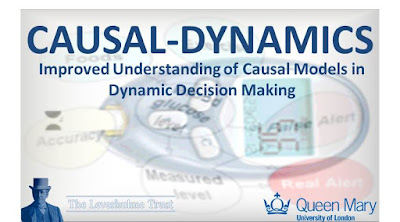The
growing importance of Bayesian networks was demonstrated this week by
the award of a prestigious Leverhulme Trust Research Project Grant of
£385,510 to Queen Mary University of London that ultimately will lead to
improved design and use of self-monitoring systems such as blood sugar
monitors, home energy smart meters, and self-improvement mobile phone
apps.
The project, CAUSAL-DYNAMICS ("Improved
Understanding of Causal Models in Dynamic Decision-making") is a
collaborative project, led by Professor Norman Fenton of the School of Electronic Engineering and Computer Science, with co-investigators Dr Magda Osman (School of Biological and Chemical Sciences), Prof Martin Neil (School of Electronic Engineering and Computer Science) and Prof David Lagnado (Department of Experimental Psychology, University College London).
The project exploits Fenton and Neil's expertise in causal modelling using Bayesian networks
and Osman and Lagnado's expertise in cognitive decision making.
Previously, psychologists have extensively studied dynamic
decision-making without formally modelling causality while
statisticians, computer scientists, and AI researchers have extensively
studied causality without considering its central role in human dynamic
decision making. This new project starts with the hypothesis that we can
formally model dynamic decision-making from a causal perspective. This
enables us to identify both where sub-optimal decisions are made and to
recommend what the optimal decision is. The hypothesis will be tested in
real world examples of how people make decisions when interacting with
dynamic self-monitoring systems such as blood sugar monitors and energy
smart meters and will lead to improved understanding and design of such
systems.
The project is for 3 years starting Jan 2017. For further details, see: CAUSAL-DYNAMICS.
WATCH THIS SPACE FOR THE ANNOUNCEMENT VERY SOON OF TWO OTHER MAJOR NEW CROSS-DISCIPLINARY BAYESIAN NETWORK PROJECTS!!
About the Leverhulme Trust
The
Leverhulme Trust was established by the Will of William Hesketh Lever,
the founder of Lever Brothers. Since 1925 the Trust has provided grants
and scholarships for research and education; today it is one of the
largest all-subject providers of research funding in the UK,
distributing approximately £80 million a year. For more information:
www.leverhulme.ac.uk / @LeverhulmeTrust
Improving public understanding of probability and risk with special emphasis on its application to the law. Why Bayes theorem and Bayesian networks are needed
Saturday, 17 September 2016
Friday, 16 September 2016
Bayes and the Law: what's been happening in Cambridge and how you can see it
 |
| Programme Organisers (left to right): Richard Gill, David Lagnado, Leila Schneps, David Balding, Norman Fenton |
For those of you who were not fortunate enough to be at the first formal workshop "The nature of questions arising in court that can be addressed via probability and statistical methods" (30 August to 2 September) you can watch the full videos here of most of the 35 presentations on the INI website. The presentation slide are also available in the INI link..
The workshop attracted many of the world's leading figures from the law, statistics and forensics with a mixture of academics (including mathematicians and legal scholar), forensic practitioners, and practicing lawyers (including judges and eminent QCs). It was rated a great success.
The second formal workshop "Bayesian Networks and Argumentation in Evidence Analysis" will take place on 26-29 September. It is also part of the BAYES-KNOWLEDGE project programe of work. For those who wish to attend, but cannot, the workshop will be streamed live.
Norman Fenton, 16 September 2016
Links
- Watch the presentations from the workshop "The nature of questions arising in court that can be addressed via probability and statistical methods" from 30 August to 2 September.
- "Bayesian Networks and Argumentation in Evidence Analysis" 26-29 September
- Isaac Newton Institute (INI) Programme on Probability and Statistics in Forensic Science in Cambridge
- BAYES-KNOWLEDGE project
Subscribe to:
Posts (Atom)

